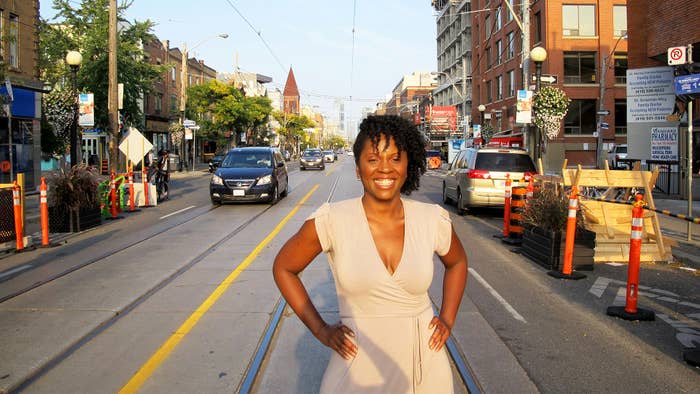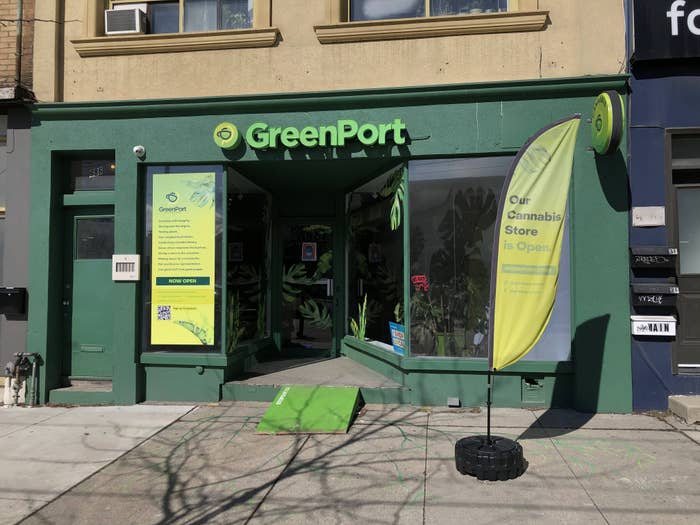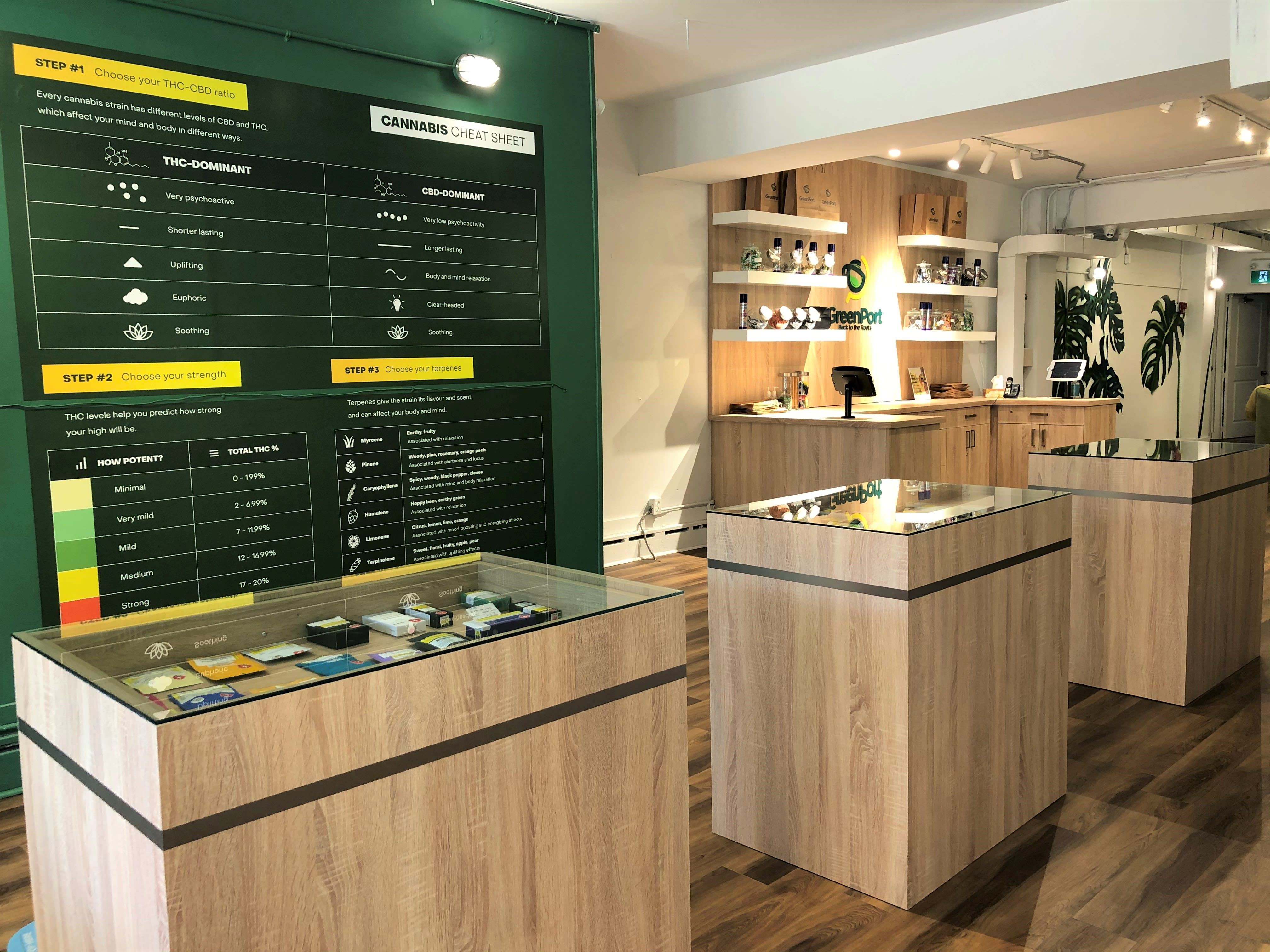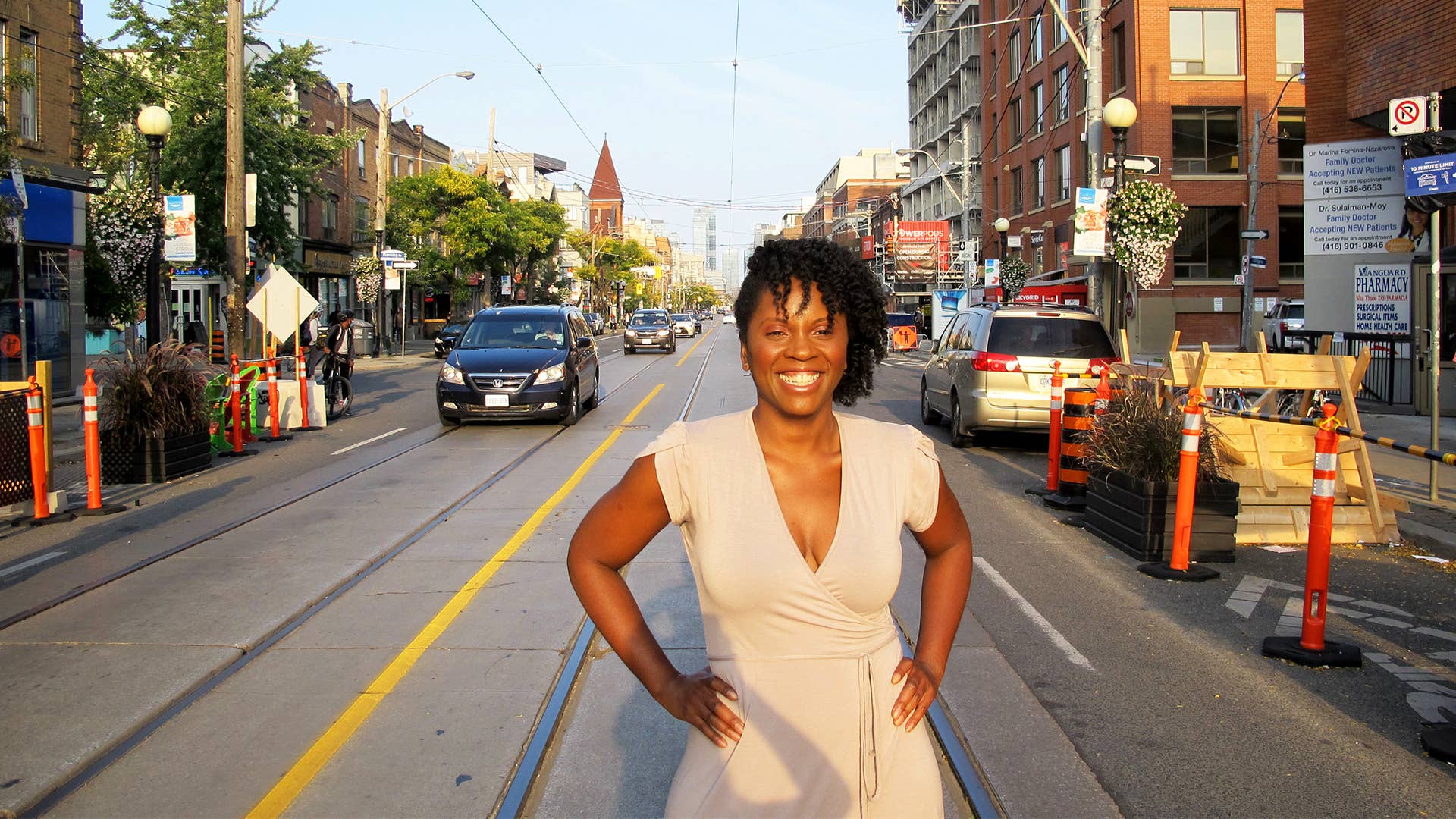
To most people, Canada’s cannabis industry is seeing high times. In 2019, it generated $1.2 billion in adult sales alone, and in 2020, that number more than doubled, jumping to $2.6 billion. Overall, cannabis has added $43.5 billion to Canada’s GDP since becoming legalized in 2018.
From the outside, things appear to be in the green, but it’s not easy to make it in the industry, even when you’re one of the major players—revenue at Canopy Growth plummeted to $140.9 million from $152.5 million a year ago. It’s especially challenging when you’re a smaller cannabis business launching during a global pandemic—this is something entrepreneur Vivianne Wilson knows firsthand as the founder of GreenPort, a Toronto-based dispensary.
With GreenPort, Wilson has made history as the first woman of colour to run a cannabis company in Canada. With the label attached to her business, one might assume she feels the pressure to succeed. However, she says her goal is to build community through her business, and along the way, address some of the gaps in Canada’s cannabis sector that have historically left women and people of colour behind.
It’s no secret that Black and Indigenous people have been more likely to be charged with weed possession than their unracialized counterparts, and repairing the damage to those communities is something Wilson is vocal about through her work. In many ways, enjoying weed has been weaponized against BIPOC folks because a “negative stereotypical narrative has wiped out all of the long histories of use from a spiritual, religious or just a health perspective,” she says.
We spoke to Wilson about the importance of making cannabis accessible and inclusive for all, the power dynamics in the industry, and her advice to other women looking to get started in the space.
So obviously I’m sure you’ve heard this many times before, but you’re the first woman of colour to run a cannabis company in this country. Do you feel any pressure knowing that you have that label attached to you, attached to your work?
No, I wouldn’t say I feel the pressure because of that label, I feel the pressure because of the pressure I put on myself to do the things that I need to do or that I had hoped to do within this space. This was never about me. Getting into cannabis was never just about me. Starting this business was about me supporting grassroots ganja farmers in Jamaica, and so I haven’t been able to do that, you know, [with] regulations, [the] pandemic… all of those things have really restricted my plan for the space or for what I wanted to achieve in this space. So if anything, that’s what adds the pressure.

You’ve really advocated for making cannabis accessible and inclusive for everyone. So why are those things so important to you and for your business?
It’s important because for so long, for the last century, we’ve been fed this very false narrative about the plant and a lot of people, predominantly people of colour, so Black, Indigenous, and a lot of Latin American and South Americans as well, have been heavily targeted because of the use of cannabis. And then all that negative stereotypical narrative has wiped out all of the long histories of use from a spiritual, religious, or just a health perspective. So all of [those] thousands of years of history has been lost within the last 100 [years], within the last century. And so that’s why it’s so important to make sure that it is inclusive so that it doesn’t become the story of the now. You know, it’s not a planet of the people of the now, right? It’s a planet of the people of yesteryears who really introduced this plant to us, who introduced the history, the culture and those people shouldn’t be forgotten. And hopefully, they will eventually be able to financially monetize and benefit from this industry financially as well.
I mean, we see this a lot happening and for a lot of us, we haven’t seen it within our timeline and within our generation, where something that was just natural just became tainted and everyone associated with it in the past also got tainted. And those who are reaping the benefits from it weren’t those people who were reaping the benefits from it when it was tainted, too, by any means. So yeah, we see that so often. And this one, I think, is really blatant because a lot of people lost their lives and their freedoms because of it.
Yeah, actually, I was going to ask about that as well because I mean, it’s a fact that there is a disproportionate number of Black and Indigenous and people of colour who have been arrested for cannabis-related crimes. What do you think needs to happen in order to remedy that? If there’s anything that you could point to as being a concrete way to change it, what would you say?
Well, I mean, it would start with the Canadian regulations and what their aim was at the beginning. Was their aim to repair the damage done? And clearly, by the regulations, you can see that wasn’t their aim at all. So I mean, something that New York state’s doing would have been the ideal thing for Canada to do, which is give priority to families and people who have been impacted by the war on drugs, by the mass incarceration of people who are using cannabis. And if we were able to make that a priority, even dropping the charges, getting people out of prison, then we can say that the government had the intention of repairing some of the damage done. But the fact that the regulations are set as they are, the costs are so expensive to even just get into the industry, it was just meant to become something that’s commoditized and not something that repairs any of the damage done.
Yeah, definitely. It almost just sounds like there’s a whole piece that’s just missing or wasn’t even thought about.
Yeah. And so that’s one thing I always speak to is that the decision-makers need to represent the people most impacted by the decisions that are being made. The people at the decision-making seat within the federal government were never the people that were most likely to be targeted or the most most likely to be impacted by the previous rules and the new rules. So how are they able to make these types of decisions? Yes, they may have gotten feedback or input, but as the final decision-makers, they definitely would have tossed those inputs to the side. So I think it’s, you know, we talk about representation, but this is where these types of representation really need to take place is at those decision-making seats when they’re making decisions that impact not themselves but impact other people, those others need to make sure that they’re at the table as well.
“I think the smarter play is to always try to look for those gaps and look for that niche and then trying to monetize and monopolize or take advantage of it.”
One hundred percent. Representation definitely matters. And that also kind of made me think about the fact that obviously, this is a very male-dominated industry. Just in 2019 alone, there were only eight female CEOs and 92 male CEOs in Canada’s cannabis industry. So I guess, does that surprise you at all? And do you think this is a trend that’s going to continue as you move forward?
It doesn’t surprise me because when you look at the rules of the game in order for you to play, you have to have money to play. That’s the reality of it. And those who have money to play would have already had CEO seats. And there’s the vast majority of people who have CEOs seats, whether it’s in the banking industry, the financial industry, agricultural industry are male, so it’s not surprising that they just usurp the seats within the cannabis space as well; it’s an easy transition.
And then when you’re looking at cost, it’s multimillion dollars to get things set up, so who would people have the most confidence in, even regular investors? Who would they have the most confidence in giving that amount of money and responsibility to? So I’m not surprised. But I think what we need to point to is the fact that those same companies that are headed by the quote-unquote leaders have lost billions of dollars in the last two years. [A] significant amount of them have been fired. A significant amount of their facilities have been shut down. So we have this confidence in these groups of people, and even when they demonstrate their inability to perform at that level, we assume that they should be able to perform, they are still the ones given the opportunity. So I think that’s where we need to really, ask the question, right, how many opportunities of failure are they getting versus someone like me? You know, the length of that runway is dramatically different. And we see some of the exact same behaviours in this industry as in others where thousands of people are being let go during a pandemic. Yet the CEOs get millions in bonuses, you know, so it’s those same, you know, same behaviors, same practices just being applied in this industry as well because you’re just borrowing the exact same players from the other teams.
“The longer [women of colour] take to get in the space, the further we’re going to be left behind. Because this industry, although it moves slowly, it moves really quickly.”
I was surprised to hear you just mention them being fired and losing money because I feel like there’s this constant narrative of, “the cannabis industry is booming [and] people are making billions”—it’s rising year over year. So I’m curious to know a little bit more about that because I think it’s something that not a lot of people talk about or know that much about.
Yeah, I would say it’s not a lot of people know that much about unless you’re in the space, because of people sharing this information are people within [it] like lawyers within the space or people within the space. And then, of course, the people absorbing it are going to be people within the space as well. So even the mainstream media has kind of lost interest in cannabis. So many other things have happened and it didn’t create this “Oh my God, everyone’s getting high” [narrative]. It didn’t create this kind of… whatever they thought it was going to create. So it’s a regular retail business, for the most part. But yeah, I mean, if you look at any of the top companies, not one of them is profitable. Like one of the top companies, Canopy [Growth] has lost over a billion dollars.
I had no idea. I feel like again, people in Toronto especially, you walk down the street [and there’s] a cannabis shop on every corner. So most people, I think, are under the impression that this is doing so well because it’s everywhere. So that’s very, very interesting.
On the retail side, stores are shutting down all the time and people are just walking away. You have large players like Dutch Love, who shut down all of their stores in Toronto. So that’s happening. And stores are still opening, but as soon as they’re opening, they’re realizing that the numbers aren’t really reflective of what’s actually going on in this space.
Yeah, no, that makes sense. And I guess sort of going back a little bit to what we were talking about with there not being very many women who are in positions of power within this industry and even minorities as well. There was a study that talked about how there are a lot more white men entering the space. As we kind of alluded to, the fact that obviously, it’s easier to do already coming from money and then and if they’ve had a leadership position before, do you think that there’s going to be more minorities and women of colour getting the chance to be leaders in the space?
My honest answer is no, I don’t think that. And the longer we take to get in the space, the further we’re going to be left behind. Because this industry, although it moves slowly, it moves really quickly. Trends change, products change, regulations change and it all still stands still at the same time. It’s the weirdest type of industry to be it in that sense, but I guess [it’s] because it’s a new industry, so that would be expected. But the longer we do take to take those positions, the further behind we are. I’ve learned so much in the past two years, especially during the pandemic. I always say, it would have taken a decade to learn what I’ve learned the past two years, but I don’t necessarily think that the right play is or the only play is to just try to become a CEO of a cannabis company.
There are, I think, probably the people who have had the best returns have been those who have auxiliary services who are able to find the gaps and fill them and who are able to be really small and nimble and change as the tides are changing as well. I think if you’re trying to be a part of that large player game, it’s one it’s quite expensive to get into. No one has really been winning successfully from it and you’re not able to shift as quickly as if you created something that was way more nimble and efficient. So I think the smarter play is to always try to look for those gaps and look for that niche and then trying to monetize and monopolize or take advantage of it.
“The fact that I was able to do it on my own meant that I was able to tell my story in the way that I wanted to tell it in the most authentic way to me.”
Yeah. And then you mentioned how you learned so much over the past couple of years—what have been some of the biggest takeaways for you and maybe some of the most rewarding things that you’ve learned throughout your entire experience?
Oh, man, I think that building community is really important. Having a strong message and an authentic message like one of the reasons why I said when I initially started in the space, of course, I was trying to do it like everyone else, was trying to get investors and, you know, go big and then do whatever else and that was a hard lesson in itself. But it was a good lesson because the fact that I was able to do it on my own meant that I was able to tell my story in the way that I wanted to tell it in the most authentic way to me. Even some of the larger players there, their narrative has changed so many times that you honestly don’t know what it is that they’re selling or even trying to do. But because what we’ve been able to build has been so authentically me and just the people within our community—and when I say community, I mean the GreenPort community—we’ve been able to stay true to that and people can realize that and it resonates with them. And it’s because of that, why even during a pandemic when people are told to stay at home, you know, we still get more people coming into the store than ordering online. You know, every break is like, “Oh, what are you doing?” “I’m just on my break.” So you come for a walk, you have a quick chat with the person and they go back home. So I think that is one of the major things that I’ve learned is you definitely got to build that community. And it requires a lot of work. It requires a lot of commitment and, you know, always trying to be authentic about it. But when it’s real and it’s you, it’s it becomes a lot easier, I think.
Yeah, I’m sure. I mean, I imagine you’ve heard a lot of good feedback from your customers, obviously just from what you said just now. So I feel like having that connection and they can identify with you as the brand, but also as a person making a change, I think definitely matters to people.
And that’s the one thing, some of the feedback that I know my myself and my team members have [is], we have some of the best customers ever. I mean, they are coming in to buy weed, so we always say, you know, you can’t be angry coming in to buy weed, right? There’s no rhyme or reason for that. We can’t really say, “Oh, you know, it’s so horrible. It’s so hard.” These people, our customers, are really great. And I think that’s because they know that we are just that space where anyone and everyone is welcome. You know, you come in, they share very intimate stuff. We’re like the bartenders, people open up [and] all of that. Like that’s the type of experience we have as well, where people open up.
But overall, we don’t have a bad experience like that. Our general community that comes in [are] really great people to be around every day, especially during a pandemic and you have to deal with people and and it made it dramatically easier to have to go through the pandemic because we just had great people.
Yeah, people make a difference. Good people make a difference. Make everyone’s lives easier.
Yeah.
So you as a woman in this space, what advice do you have for other women who are looking to get started in this industry?
Oh my gosh, I would say, don’t waste time with the assholes. You know, if someone is giving you a hard time and if they’re not taking you seriously, move on. Don’t waste the time on that one when there are ten others that you can have meaningful discussions with because there are people who are willing to help, you know what I mean? And I would say, find that network, find those people; referrals are are amazing. I’m dealing with the lab right now and I got a referral to the lab.
The way that I, and again, this is my experience, I don’t know if it’s the general experience, but I think when somebody is introducing you to someone else, it’s it reduces that barrier. So, I would say, find that network and there are many people [who] are willing and open to do referrals and introductions for you. I think those help to break the ice a lot. And again, find that niche where you can tell your story. You can position yourself to be successful and just use the resources around you and find the people who can help you navigate the space. And that’s that would be my best advice. Yeah, it can work. It can work. You just got to hopefully nail down those three elements of it. And remember, I didn’t even say money. No matter how much money you have, those three elements there can make or break whatever it is, whatever it is that you’re doing.

What are your plans for the future of GreenPort like? What’s next for you guys?
Man, we’ve got a few things on the go. Right now, we are so glad that events are back. We’re going to be partying hard this summer. We’re trying to make sure that we’re at most of the outdoor festivals that would allow us to be there to provide education, cannabis education. So we’re definitely looking forward to that. We’re looking forward to having events at our store again. People can be inside [or] outside, so that’s really great.
Just being in the space for the last two years has shown me that you also have to diversify. You can’t just do one thing within this space because it changes so much and it’s been, you know, a very hard industry to be in from a financial perspective because most of the time we’ve been operating during a pandemic. And so a lot of people have been impacted by that and retail stores, especially downtown, were impacted by that as well. So we’ve started, we’re starting, we’re looking at developing a cannabis-infused root beverage. That’s going to be really nice, that’s been fun to explore again, using the traditional type of plants that we’ve been using across the Caribbean and Asia and Africa and what have you. Different names, but same plants, and infusing that with cannabis.
We’ve also started this tasty box, and tasty box is, you know, what do cannabis users get? They get the munchies. So we’re starting this box—it’s totally separate from the way we can sell cannabis, but has snacks from across the Caribbean, Africa, Asia, Latin and South America.
Oh, that’s amazing.
Yeah, so just different things and that again, so when you asked the question of, you know, what advice would you give, that was me being in the space, seeing a niche and seeing something where I could utilize my knowledge of cannabis users, my knowledge of the Caribbean and, you know, different foods that we enjoy and snacks and different things like that and putting that together and say, “OK, how do we make this work?” and then just doing it and reaching out to my network to say, “Hey, I’m doing this, you want it? You know, how about you try this?”

